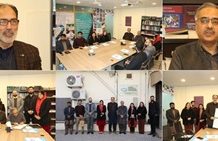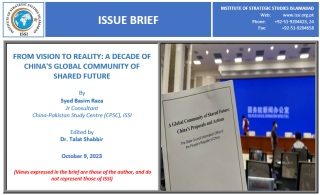The Chinese vision for a global community of shared future is entrenched in the idea of building cooperation, mutual development, and peaceful coexistence among nations. This vision particularly emphasizes principles such as peace, inclusivity, and win-win cooperation for all, transcending the existing differences of culture, ideology, and socio-economic status. The core idea of this vision is the belief that various global challenges such as climate change, security, or development, can be effectively addressed only when there is collective action and collaboration among states. China sees itself as one of the most responsible stakeholders in this regard, aiming to contribute positively to the well-being of the people worldwide. Accordingly, China issued a white paper on Global Community of Shared Future, encapsulating the progress made during a decade since it was first proposed.[1]
The examination of this decade long progress is of high importance as it provides crucial insights into China’s role as a global actor and its contributions to global governance, economic development, and conflict resolution at the international level. The assessment will help evaluate the importance of Chinese initiatives such as the BRI, and global cooperation programs on global and regional levels.
















